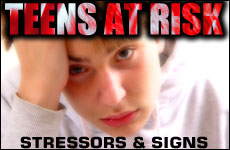 Vampire Weekend's Surprising Jewish Stories
Vampire Weekend's Surprising Jewish Stories


5 min read
A guide for knowing when it's time to get help.
Have you ever leafed through a medical encyclopedia? Suddenly you became a hypochondriac, certain the few symptoms you have match some catastrophic illness.
The same is true of the warning signs for at-risk teens. Your adolescent may have one of the signs (many do), a few of these signs, or even a cluster. That doesn't mean your child is necessarily at risk.
With one symptom you should probably just relax and assume your teen is normal. A few symptoms are like a yellow light; proceed with caution. Many symptoms are a more serious warning, but don't panic. Consult with teachers and friends, and seek professional help. It's not a death sentence.
Recognize that behind his mask of defiance or hostility, your teen is hurting. Above all, keep reaffirming your love.
As we examine some behaviors that are cause for concern, you may feel racked by guilt. This is not necessarily about bad parenting. This is not about what the neighbors will think or how others will judge. It's not all about you. Children have free will. They will act out even in "the best of families."
This is a child in pain crying out for help. Recognize that behind his mask of defiance or hostility, your teen is hurting. Above all, keep reaffirming your love.
Why do there seem to be so many adolescents at risk, such high numbers of kids on the fringe? What's changed?
There is a heightened level of personal freedom. With two working parents, there are many latchkey children in our communities. In general, kids are on their own much more than in the past. They're not in a small town surrounded by all their relatives. Add to that increased academic pressure, and you have a volatile mix. If you're feeling the situation is beyond control and see trouble is around the corner, don't wait to call in a professional. Act now.
What are some potential stressors? (Remember, only potential.) The following list of factors does not indicate teens at risk. This is a list that correlates with or frequently leads to a troubled teen. They are not foolproof; they are not exhaustive or exclusive. They're a "heads-up."
SIGNS TO WATCH FOR
Assuming you have some of these or other stressors in your family (and who doesn't?), what signs should you watch for? These are the actions of your teen that scream out "trouble," especially when more than one is present. If you haven't already, it's time to talk to the professionals - the teachers, social workers, therapists. We may be highly educated and extremely competent, but we are all subjective about our own children. We need an outside perspective. We need help. And it's available.
Sit down with your spouse and calmly evaluate the situation. If required, consult with a mental health professional. If there is a problem, it can usually be fixed. Your teen can be helped. Your teen wants to be helped. They don't have the words; they're in tremendous pain. We may not know why. There's no blame to be assigned; just good solid work to be done. And never giving up.
A wise rabbi whose daughter was at risk related to me that at one point, when things were really bad and every conversation involved cursing, his daughter would scream, "I hate you! I hate you!" And he replied, "I love you and I'm going to keep loving you more than you hate me!" When she finally reached a point of desperation, and she wanted to climb back up and reconnect Jewishly, whom did she ask to help her? Her father, who had clearly communicated that whatever she did, wherever she went, she was his daughter and he loved her.
